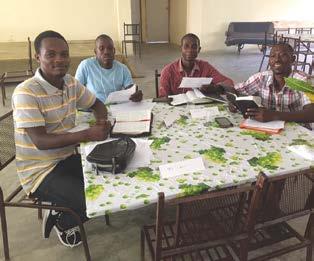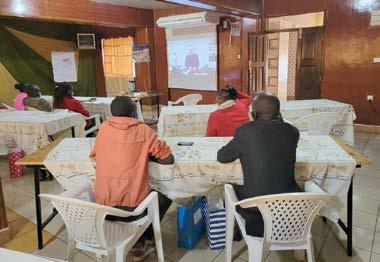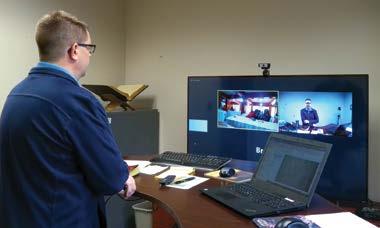
8 minute read
Winebrenner Theological Seminary: Partnership with the CGGC Around the Globe
by Ben Tobias, Director of Global Reach with Dr. Brent Sleasman, WTS President
Recently, Ben Tobias had a conversation with Dr. Brent Sleasman, President of Winebrenner Theological Seminary, about a partnership that reaches around the globe. Together, the CGGC and WTS are working to maximize their collective potential for Kingdom impact!
1. Winebrenner has a long history of working in partnership with the CGGC— as evidenced by so many of our pastors and leaders receiving their training there. So it’s natural for the connection to extend beyond the USA into the global CGGC. Please describe how WTS first got involved in Haiti. How did God open this door and what motivated you to enter this partnership?
During any given term somewhere between 35-50% of our students are from the Churches of God, General Conference. In fact, one of our graduates in July 2021 was Haley Day, who (along with her husband, Jacob) is a Global Reach missionary to the US Southwest. What makes Haley’s story even more personal is that she is from the same church where I grew up – the Indian Head Church of God in the Allegheny Region.

Haley Day
The connections between the CGGC, Winebrenner, and Global Reach extend back many decades with many CGGC missionaries serving after graduating from Winebrenner. I’m often asked “which Sleasman family” do I belong to – in the late 1960s and early 1970s my aunt and uncle (Donna and Earl Sleasman) served as missionaries, with their final assignment in Haiti.
Prior to accepting the position of President of Winebrenner Seminary, I was a tenured faculty member at Gannon University in Erie, PA. Through our local church I connected with Emmaus Biblical Seminary (now Emmaus University) near Cap Haitien, Haiti, and was able to teach several courses for them. I saw first hand the impact that an education can have in Haiti where, for many students, the opportunity an education provided was literally a life or death proposition. On one of those trips Ken and Betty McIntyre drove over the mountain from Borel and picked up our family and hosted us for a few days. I carried this conviction with me to Winebrenner and, in partnership with the Great Lakes Foundation and Great Lakes Region, we were able to begin offering courses in the fall of 2016.
2. What are some of the blessings and challenges you’ve encountered?
The blessings are enormous. The students are eager to learn about God’s Word and how to serve more effectively as pastors and missionaries in their own communities. Even though we teach in Haiti through an interpreter it’s fascinating to see how similar we really are. Also, we’ve been able to build bridges with US pastors and churches as well as a result of our efforts in Haiti.

Haitian Students in 2019
Some of the challenges are unique to an international context. Currently, Haiti is suffering through an unstable political climate and natural challenges like an earthquake and tropical storms. These raise questions about the ability to travel. Also, in the US most of us can take for granted consistent internet access so even if travel wasn’t possible (for example, during COVID-19) we could FaceTime or Zoom with our family members. An unreliable internet is also a challenge for Haiti and other international contexts.
3. In recent years, this partnership has extended to Kenya as well. What is the current status of leadership training there? How does it compare or contrast with Haiti?
Since we’re talking about collaboration, I’ll comment upon that for a moment. It’s interesting to see what doors open after we take the first step. When we first explored education in Haiti upon my arrival at Winebrenner, there were definitely more questions than answers. But, in spite of the questions and challenges, I traveled with Pastor Kevin King while he taught the first course in September 2016. Through that experience God revealed additional opportunities and opened additional doors, most recently in Kenya. My encouragement to those seeking new areas of ministry is to take the first step and see what happens!
In January 2020, I accompanied a team to Kenya, led by Pastor Nancy Boyer, from the Eastern Region. One of the challenges in Kenya is that pastors need training from an accredited school like Winebrenner Seminary. Since there was a clear need, we were invited into the conversation as a possible solution. During that week I had the privilege of teaching a brief session on homiletics (preaching) to the Kenyan pastors and leaders.
In 2021, despite the challenges of COVID-19, we were able to offer a second course focused on Old Testament Foundations. Nancy and Lisa Wilt were in Kenya and shared some pre-recorded lectures and I met with the students for two hours by Zoom every morning (pictured below). With the time difference I was starting my day from 7:00 – 9:00 a.m., while they were finishing up their afternoon at 3:00 – 5:00 p.m.

Kenyan students meeting with Dr. Sleasman via Zoom

One major difference between our experience in Haiti and Kenya is that Winebrenner initiated the efforts in Haiti while we were invited into the opportunity in Kenya. I believe this is confirmation that Winebrenner’s partnership with Global Reach is God-ordained and consistent with the Spirit’s leading. We are now working with the Great Lakes Region and Great Lakes Foundation in preparation of courses in 2022 in Kenya.
4. How can churches and individuals partner with WTS in these areas? (Global Reach is establishing designated education funds for all fields next year, so I’ll provide this information as a way for churches to provide scholarship support.)
Like any spiritual endeavor, prayer is a priority. The challenges of traveling to an educational setting or establishing a working internet connection is a real spiritual battle in many places. Second, as we continue to offer consistent experiences the need for qualified faculty will only grow. A church can be a major blessing by allowing a pastor a week or two (depending upon the context) to travel to an international setting. The pastor will feel supported and they will learn new and creative ways to minister in their own communities. As you’ve noted, financial support is needed for these efforts for travel for instructors or the ability to record quality content, scholarships for students, and basic administrative costs to support the students’ learning.
One dream I had while I was in Haiti for one of the classes was the potential for having US pastors and students sit with Haitian students in the classroom. Imagine studying something like the letters of Paul in an international context!
One of our priorities is collaboration and partnership and we greatly value the relationship with the CGGC in the US and abroad. Today, Winebrenner Theological Seminary is a global network focused on stewarding followers of Jesus who flourish in their vocations for the sake of the world. The partnership with the CGGC enables us to follow the Spirit into the future together.
Winebrenner is actively working toward affordability, accessibility, and quality. We are striving to keep our ongoing costs low so we can continue to be creative in what we provide in the United States and internationally. Students in Haiti, Kenya, and other international contexts don’t have ready access to quality education – we are working to remove the obstacles in terms of costs and course design to increase educational opportunities.
6. Winebrenner’s involvement isn’t just with global connections, of course. There’s also a new model of partnership with CGGC congregations and regional conferences in the USA as well. Please share a description of where WTS is connecting with churches.
I’m going to rely upon a technological metaphor to answer this. You likely have a smart phone or know someone who has a digital device that uses either the Android or iOS (Apple) operating system. When using those devices you need certain applications (or “apps”) to access the information you want. The operating system, or platform, provides a consistent experience for all users, but the apps are what make your phone or iPad unique to you.
Winebrenner Theological Seminary is developing a “platform” for theological education that provides a consistent experience for all students – whether in the US or Kenya, whether from the CGGC or another denomination, whether from a rural or urban context, or a large or small church. We are building an infrastructure that allows students and collaborative partners to be much more creative in identifying and meeting needs.
We are connecting with churches in local church leadership development. For example, we have several churches that have students enrolled in courses like Leadership & Communication, Interpreting God’s Word, or Spiritual Formation. At the institute-level these courses are $200/course. For students interested in graduate programs we now have $300/month tuition that allows churches to develop ongoing and internal leadership development; it’s exciting to work with local church elders and talk about ways that Winebrenner can assist the training needed for a pastoral transition plan.
My experience consistently reaffirms that the best partners are those who have a clearly identified need and they invite Winebrenner into their context as a partner to solve the issues.
7. How can WTS help churches excel in their leadership development and training? What further opportunities exist?
One of the lessons of COVID-19 is that digital environments can provide more opportunities than many expected. One of the major initiatives that Winebrenner is working on is a digital platform called Co-Mission that will allow a combination of professional content and user-generated content. We want to provide a resource that allows you, as churches and leaders, to develop tools for your local congregation and community. [MORE DETAILS WILL BE AVAILABLE ABOUT THIS SOON…]
Our mission at Winebrenner Seminary is to equip leaders for service in God’s Kingdom. We want to partner with the CGGC and Global Reach to see God’s Kingdom reach all areas around the world.









